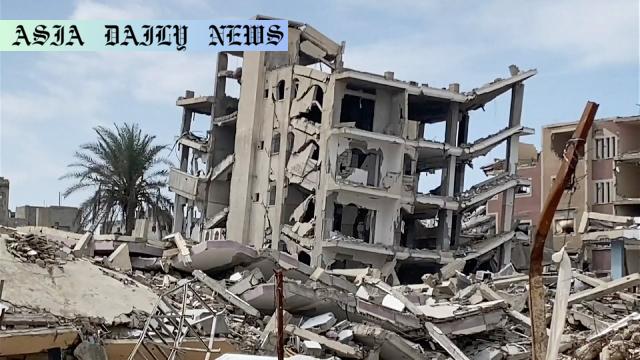Ceasefire: Hamas postpones hostage release, alleging Israeli violations in Gaza and restricted aid under fragile truce.
Hamas announced a delay in the sixth round of hostage releases, citing Israeli violations of the ceasefire agreement.
The group accuses Israel of attacking Gaza residents and restricting aid deliveries to the region.
Israeli Defense Minister Israel Katz countered, stating Hamas broke the agreement and ordered heightened military readiness.
The fragile ceasefire saw Hamas release 16 hostages, while Israel freed 760 Palestinians under its terms.

Introduction to Fragile Ceasefire and its Current Challenges
The recent announcement by Hamas regarding the postponement of scheduled hostage releases has drawn attention to the fragility of the six-week ceasefire agreement between the group and Israel. Scheduled to release three hostages on Saturday, Hamas claimed that the delay was due to violations by Israel, including assaults on Gaza residents and restricting the inflow of aid supplies. This has sparked new tensions, shaking the stability of the fragile truce established to ease longstanding hostilities.
Hamas’ Allegations Against Israel
Hamas has pointed to several instances of alleged Israeli misconduct as central reasons for the postponement. According to the group, the Israeli military engaged in attacks against civilians within Gaza—a direct violation of the ceasefire terms. Additionally, Hamas claims that Israel failed to ensure the unhindered supply of humanitarian aid to the besieged enclave. These developments have soured ongoing efforts to foster trust, endangering the successful execution of the agreement that began on January 19.
Israel’s Response to the Accusations
In response to the accusations, Israeli Defense Minister Israel Katz accused Hamas of breaking the ceasefire deal by delaying the promised hostage releases. Katz has instructed the Israeli military to elevate its level of preparedness both within Gaza and in areas of domestic defense, signaling the possibility of escalating military action. This strong reaction underscores the delicate nature of the current situation and the potential for renewed hostilities if the ceasefire collapses further.
Achievements of the Ceasefire So Far
The ceasefire agreement, enacted on January 19, initially displayed potential to de-escalate tensions in the region. Under its terms, Hamas released 16 Israeli hostages while Israel freed over 760 Palestinian prisoners. These steps were seen as encouraging signs of goodwill from both parties. However, the recent setback has thrown these achievements into question, raising concerns about the future of the agreement and the broader peace process.
The Wall Street Journal’s Take on the Situation
The Wall Street Journal has labeled this delay as the “most serious challenge yet” to the already fragile truce. The agreement stipulates the gradual release of 17 more Israeli hostages over the coming weeks. However, with tensions flaring between the two sides, the likelihood of fully realizing the intentions of the ceasefire appears more uncertain than ever. Both parties are now grappling with the complexities of maintaining peace amid deep-seated mistrust and conflicting agendas.
Humanitarian and Political Implications
The disruption of the ceasefire agreement exacerbates the humanitarian crisis in Gaza, where civilians continue to face dire living conditions. Restricted aid inflow, coupled with ongoing political disputes, adds to the suffering of the population. The situation further poses political challenges for leaders on both sides, as they struggle to balance domestic pressure and international expectations while attempting to maintain the fragile truce.
The Path Forward
Peace in the region remains contingent on the mutual adherence of both Hamas and Israel to the agreed terms of the ceasefire. International mediators and stakeholders may need to intervene to restore dialogue and ensure humanitarian aid flows into Gaza. Only through trust-building measures and a genuine commitment to resolving disputes can sustainable progress be achieved. The current tensions serve as a reminder of the longstanding complexities in achieving lasting peace in one of the world’s most conflict-prone regions.
Conclusion
While the ceasefire between Hamas and Israel offered a temporary reprieve from violence, the recent postponement of hostage releases underscores the fragile and volatile nature of peace efforts. As accusations fly and tensions rise, it is imperative for both parties to prioritize diplomacy over aggression, ensuring that humanitarian needs are not further compromised. The path forward will require patience, mutual respect, and the unwavering support of the international community to achieve a meaningful and enduring resolution.
Commentary
The Importance of Upholding Ceasefire Agreements
The announcement by Hamas to delay the release of hostages underlines the fragility of ceasefire agreements in conflict-ridden regions like Gaza. Such agreements are vital in providing temporary relief and laying the groundwork for longer-term resolutions. Any violations, real or perceived, can undermine trust and spark renewed violence, undoing the progress achieved through painstaking negotiations.
Challenges of Balancing Humanitarian Needs and Political Goals
One of the critical challenges in this scenario is ensuring aid delivery to Gaza while maintaining the commitments of both parties under the ceasefire. Civilians in Gaza are enduring severe hardships, and restricting aid further magnifies their suffering. As Hamas and Israel exchange accusations, the immediate humanitarian needs of the population must not be ignored. It is a stark reminder that political conflicts often come at the greatest cost to innocent civilians.
The Role of International Mediators
The current impasse highlights the importance of international mediators in brokering peace and ensuring both sides adhere to their commitments. Third-party oversight can help instill accountability, ensuring humanitarian aid flows freely and conditions of the agreement are upheld. Mediators also have a crucial role in rebuilding trust, fostering dialogue, and preventing escalation.
Hopes for a Path Forward
While setbacks like these are disheartening, they also emphasize the need for sustained efforts toward peace. The global community must remain engaged, urging both Hamas and Israel to resume dialogue and address the grievances causing the current tensions. Peace is rarely linear, but with consistent effort, it remains an achievable goal.


